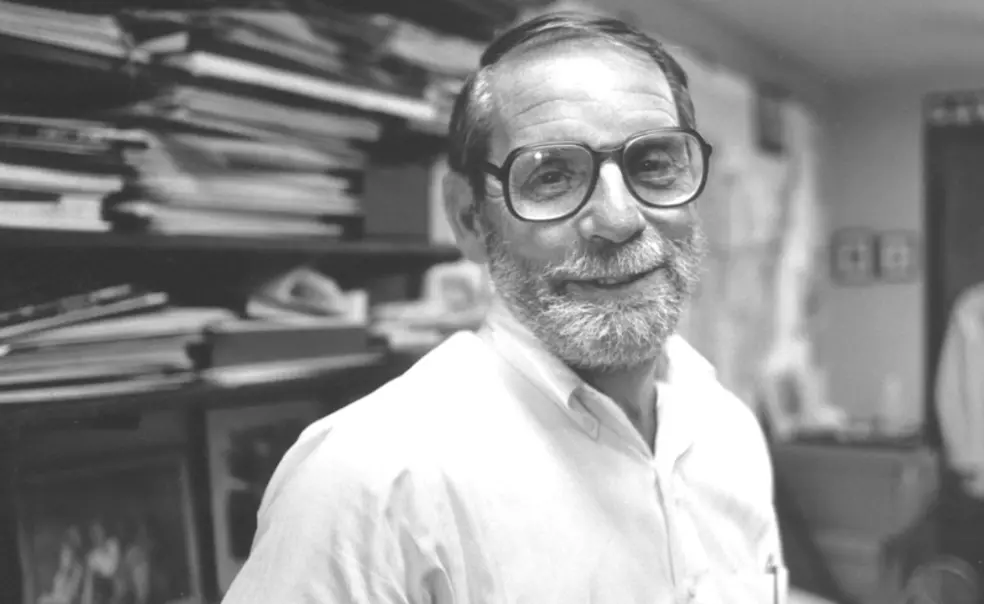New Book Chronicles the Career of Prolific Writer and Professor John McPhee ’53
Looking for a Story offers the first comprehensive inventory of the Princeton professor’s writings, beginning with his high school and college works
When he was a teenager, Noel Rubinton’s parents gave him a copy of The Headmaster, a 1966 book by John McPhee ’53 that profiled Frank Boyden, who was head of Deerfield Academy in Massachusetts for 66 years. Not only did the book convince Rubinton to apply to the boarding school (he was accepted and finished high school there) it also cemented Rubinton’s lifelong fascination with McPhee.
In May, the Princeton University Press published Rubinton’s volume, Looking for a Story: A Complete Guide to the Writings of John McPhee. It offers the first comprehensive inventory of McPhee’s writings, beginning with his high school and college works, through his career at Time magazine and then, for more than five decades, his writing for The New Yorker. All told, McPhee has published more than three dozen books, including individual works and compendiums.
“A lot of authors have a formula, and I don’t look down on that,” Rubinton says. “But McPhee doesn’t follow a formula. He tries new things and succeeds. He presents so much knowledge in an accessible way.”
Beginning with his 1965 biography of Bill Bradley ’65, A Sense of Where You Are, McPhee’s writing has addressed a wide range of topics: oranges, New Jersey’s Pine Barrens, Wimbledon tennis, nuclear energy, Alaska, Switzerland’s Army, Russian art, shad (a type of fish), and the topic that has driven him for decades: continental geology. Recently, into his mid-90s, McPhee has been writing about the process of writing itself, as well as penning shorter vignettes on subjects such as the online puzzle Wordle.
Having digested most of McPhee’s oeuvre, Rubinton concluded that his subject finds reporting and writing equally important. “He wants to watch his subjects in action,” Rubinton says, even if that means taking paper notes in a canoe navigating through the wilderness, one bump away from getting his notebooks soaked. Once McPhee has finished his reporting, he turns exclusively to writing, using highly structured organizational notes that code his material by subject matter. Rubinton says McPhee’s respect for careful structure dates back to the lessons of Olive McKee, his English teacher at Princeton High School for three out of his four years.
Rubinton, a Brown University graduate, spent most of the first four decades of his professional life as a journalist, most notably as a writer and editor at Long Island’s Newsday between 1979 and 2008. After stints in the nonprofit world and working in communications for Brown, he moved to Washington, D.C., where he pursued his dream of writing a book. One day, Rubinton came up with the idea of writing about McPhee. He met with Princeton University Archivist Dan Linke (the pandemic had closed many buildings on campus to visitors, so the two sat on a bench outside of Mudd Library), and Linke agreed to present the idea to McPhee, who welcomed the proposal.
Rubinton finally met McPhee for the first time in November 2021; it would be the first of almost a dozen interviews at McPhee’s home or in his office in Guyot Hall. Among the dozen or so research libraries Rubinton visited, two were especially notable.
One was the archives of Time magazine, now housed at the New York Historical; when McPhee wrote for Time, no story had a byline, but Rubinton discovered the existence of bound volumes where every issue was annotated in grease pencil with the initials of the writer, editor, and researcher who worked on each story. Rubinton found hundreds of occurrences of “JM,” which he double-checked with McPhee to confirm authorship. The other treasure trove was the UCLA Film & Television Archive, where Rubinton was able to watch one of several television episodes McPhee wrote the screenplay for in the mid-1950s, for an NBC drama show called Robert Montgomery Presents.
Princeton featured prominently in McPhee’s mind, beginning with his writing for PAW and the Princeton Tiger as a student; later on, it often provided him with ideas to write about. McPhee has had “an incredible connectedness,” Rubinton says. “Today, it would be called ‘networking.’ A lot of it was connected to Princeton.”
During visits to campus, Rubinton watched as the then-92-year-old McPhee “bounded up the stairs” to his turret office in Guyot. In a twist of fate, his office had once been occupied by the geologist Eldridge Moores *63, the featured character in McPhee’s 1993 volume, Assembling California. In the office, Rubinton saw shelves lined with books authored by some of the 544 students McPhee taught between 1975 and 2020.
“The heart of the course was that every other week, he would spend half an hour with each student,” Rubinton says. “He would go over their piece and give back this incredible marginalia. The notes could be cryptic and hard to read, but most students have saved every paper they wrote.” About a quarter of his students ended up publishing at least one book of their own.
One of those was Peter Hessler ’92, a New Yorker staff writer who contributed the foreword to Rubinton’s volume. Hessler recounts a favorite McPhee metaphor, that of a writer as a canoeist who has to decide which islands to stop at. “Poor decisions become costlier as the writer grows older,” Hessler wrote. “Lingering on the banks of one island might mean that you might skip another, and from a distance it’s hard to tell which of the two is barren.”
While McPhee is hailed as a writer’s writer, Rubinton says, he never had the “social cachet” of some of his writerly contemporaries, such as Tom Wolfe or Joan Didion, who became celebrities. To Rubinton, that suggests that McPhee devoted more effort to refining his craft and producing a prodigious amount of work than he did to ginning up publicity. “I hope the book will make people more interested and excited about him,” Rubinton says.
Louis Jacobson ’92 is chief correspondent for PolitiFact and chief author of The Almanac of American Politics 2026.













2 Responses
Dave Fulcomer ’58
7 Months AgoA Helpful, Humble Princeton Treasure
I was glad to read your article in the most recent PAW about John McPhee ’53, one of Princeton’s genuine treasures. It’s embarrassing to note that he is still spry at 93 while I am slowing to a crawl at a mere 89.
No, I never took one of Mr. McPhee’s writing courses, but I wish I had.
We have had numerous exchanges covering everything from athletics to academia, and he has always been accessible, responsive, and kind. I did challenge one statement he made concerning the acumen of Princeton’s three-time All-American and NCAA player of the year Bill Bradley ’65. Mr. McPhee thought that it was unusual, to the extent that anything might’ve been unusual with Bill Bradley, that he was able to demonstrate that a basket he was practicing that was one inch off the correct 10 feet height. I mentioned that any basketball junkie like myself would know when a basket is off to any extent. Like everything else John does, he accepted it with grace.
Over the years we have had several exchanges, and if anything stands out in all of them, it is his helpfulness and humility. Keep on keepin’ on, John.
Matt Boyle ’97
7 Months Ago‘Looking for a Story’
Can’t wait to read this!